If you have any inclination toward photography, this could be a niche to explore. You can become a freelance photographer, start an agency, or even give courses. Not interested in working with people? Sell photo products or offer remote editing services.
These are just a few of the ideas we’ll explore in this list of 15 business ideas for photography.
1. Family Portrait Photography
Taking family portraits can be a lucrative way to turn your photography skills into a business. Just over 20% of photographers specialize in portraits, and 7.7% in family shoots. Family portrait photography is a steady business throughout the year, as families always need photos for holiday cards and special occasions like graduations, family reunions, and births.
As every family has a different budget, there’s a demand for every level of photographer. Just make sure you charge in line with your experience and skills. Family portrait photographers can further specialize in newborn shoots, family reunion portraits, or holiday photos. However, family portrait photographers need to have people skills. Emotions can run high when a family needs the perfect holiday card portrait. If you’re not a “people person,” consider product photography, equipment rental, or travel and landscape work.

Family portraits can be taken in any season; taking them outdoors allows you to use natural light, which saves on the cost of lighting equipment. (Source: Amelia Anne Photography)
Family portraits can include indoor and outdoor shoots, newborn photos, a maternity photoshoot business, and even pet photography. You might also market yourself for events like graduation or prom.
- Startup cost: $400-$2,000 to purchase the required equipment
- Requirements: DSLR or mirrorless camera; optional: 50 mm 1.8 lens, 35 mm 2.0 lens, or 85 mm 1.8 lens
- Potential income: According to freelance marketplace Thumbtack, family portrait photographers charge $200-$250 for a one-hour shoot. However, it’s not as lucrative summarily as others.
Pros
- There’s consistent year-round demand for family photos—birthdays, weddings, back to school, summer, holidays, etc.
- You can book recurring customers if they like your work. Then, you don’t need to market yourself too much.
Cons
- You might find yourself with difficult clients because the end product is so personal.
- There can be challenges in securing a location. Studios and private property can be expensive, and it’s not always legal to shoot in parks or on beaches, for example.
2. Wedding Photography
Wedding photography is a very seasonal way to monetize your photography skills. About 16% of professional photographers call themselves wedding photographers. It requires the ability to shoot events, candids, and action shots while also making the bride and groom feel comfortable for more personal staged shots.
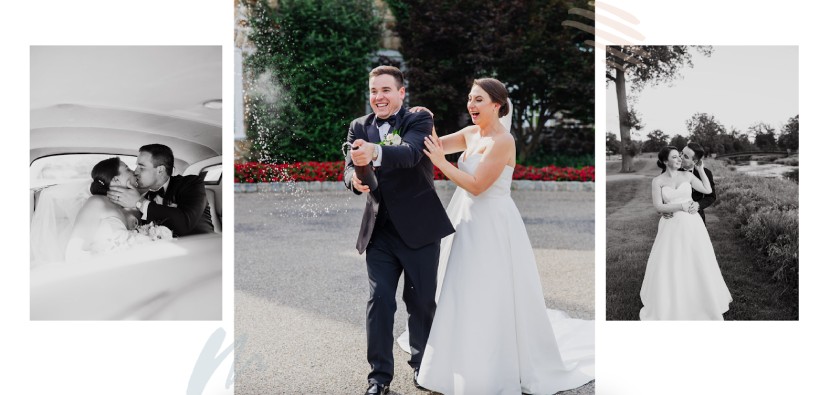
Peach Photography, for example, specializes in wedding photography in New Jersey, Pennsylvania, and New York. It’s been in business since 2014. (Source: Peach Photography)
Like with family portraits, you’ll need to be a people person and be able to work in high-stress environments. It also requires a knack for finding candid moments.
- Startup cost: $400-$4,000 for the necessary equipment. Costs are higher depending on the level of service you want to provide.
- Requirements: A DSLR or mirrorless camera; lighting equipment
- Potential income: $48 per hour is the average income, according to data from ZipRecruiter. It’s one of the most lucrative niches.
Pros
- There’s consistent demand because people will continue to get married and have weddings. People like to hire photographers even for small elopements.
- You can expect predictable seasonality. Depending on your location, there’s typically a distinct wedding season that you can plan for.
Cons
- Weddings are highly emotional for everyone involved. This can be stressful for the photographer.
- Because it’s such a special moment, there’s lots of pressure for results.
- You might run into budget constraints, as people spend a lot of money on their wedding—for event venues, invitations, flowers, catering, etc. This sometimes leaves little left over for photos.
- Seasonality can also be a con, as there are periods when you may not have a lot of bookings.
3. Product Photography
Product photography is a fairly technical business idea, especially if you’re shooting pure white background, 360-degree, or lifestyle shots. However, working with businesses often exposes you to higher budgets.

Nicoleta Frone shoots elevated product photography for consumer brands. She offers a range of photos, including lifestyle, white background, and flat lays. (Source: Nicoleta Frone)
- Startup cost: $500 to $5,000-plus depending on niche and setup; 360-degree shots, for example, will require a larger upfront investment than plain white background photos.
- Requirements: a DSLR or mirrorless camera; lighting equipment; somewhere to shoot; backgrounds (especially for white background product photography)
- Potential income: A professional photographer charges an average of $63 per hour.
Pros
- You get to work with other professionals and businesses, rather than people who are personally and emotionally invested in the shots.
- This option can require minimal effort if shooting repeatable white background shots. You just have to make the setup once, and then you can shoot all kinds of items.
Cons
- This requires an understanding of image requirements for different platforms. There are tons of platforms, and requirements continually change, making it hard to keep up.
- Product photography requires technical skill. It’s difficult for hobby photographers to transition into this niche.
4. Photo Retouching
If you don’t want to get behind the camera but love working with photography, you might consider specializing in editing and retouching. This is an especially great business idea if you know your way around Photoshop.
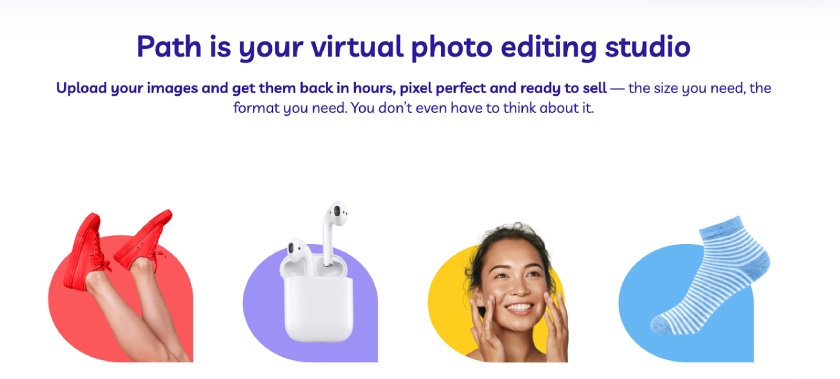
Path is a virtual photo editing studio that provides a range of photo editing services by hand. It offers background removal, retouching, color change, and more for product, headshot, and sports photographers. (Source: Path)
Photo editing and retouching are great for people who like to work independently and have an eye for detail.
- Startup cost: Photo editing software fees typically ranging from $20 to $60 per month
- Requirements: A device; photo editing platform
- Potential income: Pricing for retouching is low—some places charge as little as 65 cents per photo. And with AI advancements, income potential is likely to continue to decline.
Pros
- Photo editing is a good home business idea. You actually don’t even need a camera—just a computer, photo editing software, and internet connection.
- You get unbeatable flexibility. You don’t need to be on-site, at an event, or in an office. You can do everything from home, as long as you deliver the edits on time.
Cons
- There’s a lower income potential compared with other ideas.
- You may have a learning curve if you don’t already know Photoshop.
- AI is impacting the industry, making it difficult to justify your rates and compete with lower-cost options.
5. Photography & Creative Agency
If you want to start something bigger, you can create a whole agency. You can specialize in a specific type of photography or do all sorts of creative visual content. This can also be as big or as small as you want—anywhere from a team of two to an agency with employees at multiple offices around the world.
This idea is great for the ambitious self-starter who has a big vision. If you have good people management and sales skills, it can be a viable photography business to pursue.
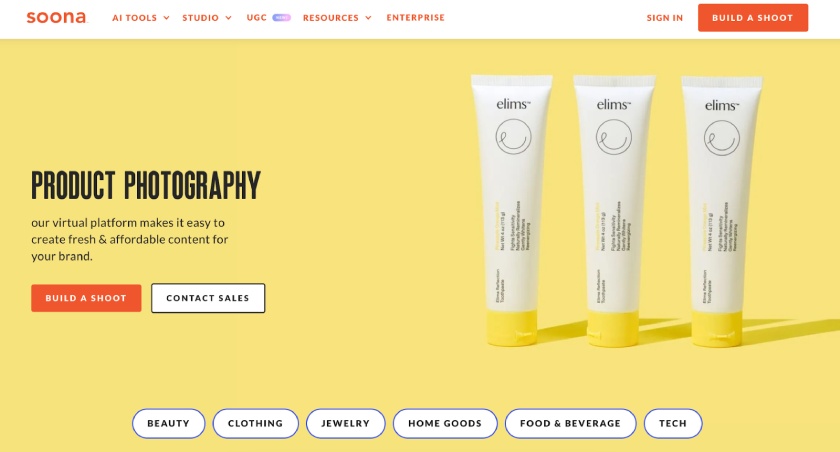
soona is a key example of a photography agency. It even offers video production and photo editing services, as well as ad content creation. (Source: soona)
- Startup cost: Varies widely depending on size and location. You can start with minimal investment by hiring 1099 contractors or invest a lot more to provide the equipment, office space, and benefits to full-time employees.
- Requirements: Business registration and ability to legally employ staff
- Potential income: While you have earning potential, there’s also greater risk
Pros
- You get a chance to collaborate with other creatives instead of working alone.
- You can fill skill gaps and work with clients you wouldn’t be able to on your own.
Cons
- There’s the added pressure of managing employees, which isn’t a goal for every entrepreneur. It can also take away from the creative aspects of photography.
- Bigger budgets bring higher client expectations. This can be a lot of pressure and sometimes difficult to deliver.
6. Photography Workshops
If you love to teach, you can host photography workshops for others who are interested in photography. You can teach the basics to hobbyists or specialize in a niche and train professionals on advanced techniques. You can choose to do these in person or online. It’s a flexible business idea that can be as big or as small as you want.
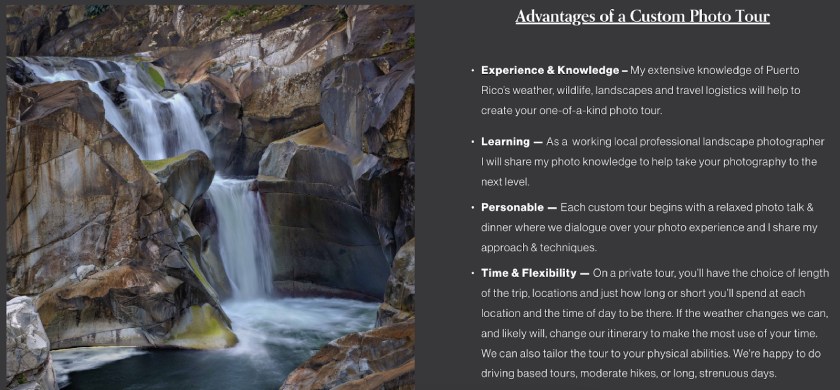
Puerto Rico Photo Adventures actually combines teaching with an element of tourism, taking clients to different spots on the tropical island as they learn how to shoot amazing photos. (Source: Puerto Rico Photo Adventures)
- Startup cost: Very minimal—in some cases, $0 because you likely already have the equipment and simply need to find a student
- Requirements: A space to host the workshop, either physically or virtually
- Potential income: Income potential varies depending on how you want to pursue this idea.
Pros
- You can serve multiple clients at once through group workshops and training.
- It can be fun to interact with others in this capacity.
Cons
- This business idea requires constant customer acquisition, which can take away from the creative aspect of photographing and teaching.
- It may not be fun if you don’t enjoy teaching—you definitely need a knack for knowledge-sharing.
7. Fashion Photography
Fashion photography can include shooting live runway shows, editorial shots, and high fashion photos for magazines and print publications. Fashion photography comes with higher expectations and often budgets to match.
If you love fashion, have advanced skills, and don’t mind shooting on-set or on-location, this can be a great avenue to explore. This is also ideal if you live in an area with lots of fashion clients, like New York City or Los Angeles.
Chloé Horseman, for example, does both. She’s a bi-coastal fashion photographer who has worked with brands like Abercrombie, Allure, and Elle.
- Startup cost: $1,000 to $10,000-plus because you typically need more advanced cameras, lenses, and lighting.
- Requirements: DSLR or mirrorless camera; 35 mm, 50 mm, and 85 mm prime lenses
- Potential income: A fashion photographer earns around $65,000 annually.
Pros
- Fashion photography is highly creative; ideal if you consider yourself an artistic photographer.
- This gig can be extremely lucrative. High fashion brands know the importance of image and often have budgets to match.
Cons
- This often means working in a high-pressure environment with a lot at stake.
- You must be based in a place with a demand for these services. It will be difficult in a market in Middle America as opposed to a big city or metropolitan area.
8. Travel & Landscape Photography
Travel and landscape photography is perfect if you love exploring new places and capturing the beauty of nature. This type of photography allows you to combine your passion for travel with your photography skills. It often involves selling prints, licensing images, or working with travel agencies and tourism boards.
If you already travel or live a nomadic lifestyle, this is a great business opportunity. Even if you don’t travel but live in a place known for tourism, it can be a good option. It’s also viable if you have an existing audience—lots of potential customers.
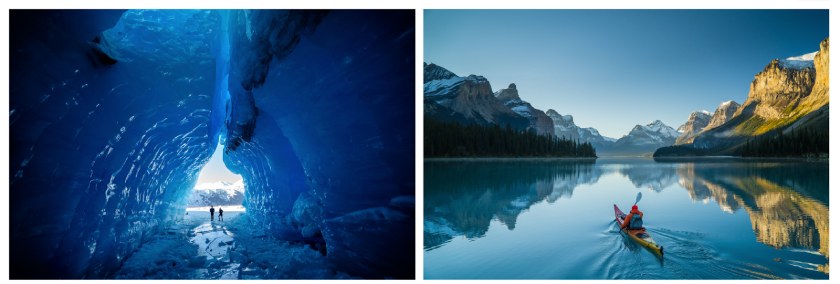
Chris Bukard, for example, is a Central California-based photographer. He shoots lifestyle, surf, and landscape photography. (Source: Chris Bukard Photography)
- Startup cost: $1,000 to $10,000-plus because you need good gear; shooting drone travel photography requires a heavier investment
- Requirements: DSLR or mirrorless camera; wide-angle lens; access to a popular destination/location
- Potential income: Landscape photographers earn about $20 per hour.
Pros
- This allows a deeper exploration into a passion for travel or the outdoors.
- You can get paid to do what you love.
Cons
- Travel costs can be expensive if you need to go elsewhere to shoot.
- You have no control over the environment and are at the mercy of the weather, other travelers, etc.
- There’s low demand for travel photography and lots of competition, so it can be hard to carve out your spot.
9. Selling Prints
Printed photos are another way to monetize your art. More than a third (36%) of photographers sold more physical products in 2023 than in 2022. There are tons of print-on-demand (POD) options to tap into, be it standard photo or canvas prints or creative products like mugs and t-shirts. In fine art photography circles, you’ll also see prints on metal, canvas, acrylic, wood, and even tapestries, like those by Jeff Folger.
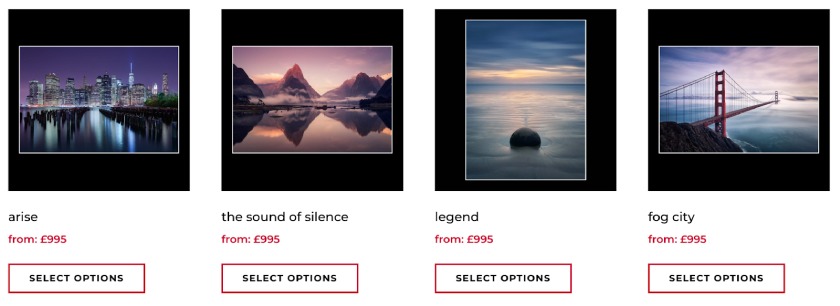
Paul Reiffer is another great example to look at for inspiration. He sells framed prints of his nature photos. (Source: Paul Reiffer)
This business idea is ideal if you’re open to the idea of building a business and brand and marketing your products to sell online.
- Startup cost: $50-$250 to build an ecommerce component
- Requirements: An ecommerce platform with a print-on-demand integration; digital photo files
- Potential income: Varies depending on how much you want to put into it
Pros
- This can be a source of passive income once you’ve built up a brand and online store.
- You can earn money from each photo more than once since it can be printed on a variety of items multiple times.
Cons
- Printed photos tend to have lower profit margins. You typically have costs like shipping, marketing, POD services, etc.
- There’s a higher potential for returns, lost shipments, or damages. These can all cut into your earnings.
- This idea requires marketing and promotion, which some photographers are not interested in doing.
10. Stock Photography
While there are many free stock photography sites, there are also lots of paid ones. Paid stock photography is typically higher-quality and often shot with a business purpose in mind. You can take photos and list them on stock photography websites and marketplaces. Each time someone purchases the rights to use your photo, you earn a small commission.
You can list your photos on a site like Shutterstock, for example, to start earning a commission. This is great if you don’t want to invest too much time and energy into marketing your business and if you’re okay with the idea of potentially low earnings.
- Startup cost: $0 because you can sell the photos you’ve already taken; many sites only take commission once you make a sale
- Requirements: A computer or mobile device; photos you took and can legally sell
- Potential income: $0.10-$200 per license
Pros
- This is a truly passive income stream. Simply post your photos on the stock sites and let it take care of the rest. Make sure you optimize for searches, though, with keywords and hashtags.
Cons
- Generally, this isn’t very lucrative. Earnings per download are minimal, many people can take their own photos these days, and there’s tons of competition.
11. Photo Booth Rental
Many parties and events feature photo booths to encourage people to take and share selfies, amplifying the event’s reach through social media. But most of these photo booths are temporary installations—and they come from somewhere.
Often, a rental service provides photo booths. This has emerged as a great photography-related business opportunity. And if you’re handy, you can likely build one with materials you already have—poster board, paint, markers, and other crafting items! If you’re crafty and creative, this can be a great option.

Virginia Beach Photo Booth Rental is an example of this kind of business. It also includes prints on the spot, though this isn’t necessary. (Source: Virginia Beach Photo Booth Rental)
- Startup cost: Minimal to get started, though you can invest more if you want to offer prints, etc.
- Requirements: Materials; registered and insured vehicle to transport the photo booth; driver with driver’s license
- Potential income: $425-$1,000 per day, per event
Pros
- There’s a high demand for photo booth rentals as people use social media at a growing rate. Visual-based platforms like Instagram, TikTok, and Snapchat demand this kind of content.
- You can build it once and rent it multiple times.
Cons
- This requires transportation—you’ll need to figure out how to deliver the photo booth safely.
- There’s potential for damages. This can happen both in transport and by your clients while in use.
12. Headshot Photography
Headshot photography focuses on capturing people, often for personal or professional use, modeling portfolios, or magazine features. This niche requires a good understanding of lighting, posing, and retouching to highlight the subject’s best features.
Photographers can support acting clients, comedians, models, and any other type of performer that uses headshots for self-promotion. You can also book commercial clients, such as real estate firms, law firms, hospitals, hotels, and websites, that use professional photos of their principals and staff to encourage client trust. This is possibly even more important in the age of AI when businesses want to showcase that they’re operated by actual people.
This photography business idea is great if you don’t mind working with people and also don’t need to pursue creative expression in your work. Headshots leave little room for creativity.
Glamour Shots is a great example—it takes beautiful headshot photos for its clients in its studio locations.

Asheville Headshots takes photos of professional clients in its local market. (Source: Asheville Headshots)
- Startup cost: $1,000-$5,000 to purchase the camera and lighting equipment.
- Requirements: DSLR or mirrorless camera; lighting equipment; retouching software
- Potential income: This niche will land you somewhere around $20 per hour.
Pros
- You can set up a studio space to reuse for each client rather than traveling to locations.
Cons
- Headshot photography is competitive. You’ll need to position yourself well to win new clients.
- Headshot photography requires a dedicated physical space. You can choose to shoot on-site, but this opens you up to a variety of factors outside of your control.
13. Photography Equipment Rental
Photography equipment rental involves allowing other photographers and businesses to rent gear for short-term use. This is often better for them financially because they don’t need to purchase the equipment for one-off or sporadic use. Your business could rent cameras, lenses, lighting equipment, and more. It’s a good business idea if you already have a substantial collection of equipment or don’t want to work with people directly.

DFI Rentals, for example, rents out cameras, lighting gear, and film equipment to clients in Los Angeles. (Source: DFI Rentals)
- Startup cost: $10,000-plus depending on the inventory—you need to have hardware available for rent
- Requirements: High-quality equipment; storage; insurance
- Potential income: Equipment rental can be quite lucrative, especially compared with other options on this list. However, it requires a significant initial investment.
Pros
- This idea is fairly passive, though not completely. You just need to figure out how to get the equipment to your clients and also make sure to maintain equipment in between rentals.
- This can provide a steady income, as people may need to rent equipment in the future.
Cons
- There’s a high risk of damaged or lost equipment, which can be costly or create uncomfortable situations.
- Maintenance and knowledge of how to properly maintain the equipment are required.
- Insurance costs can be high.
14. Photo Styling
A freelance photo stylist creates the visual concept for a shoot, including selecting the wardrobe, props, and backgrounds. This business idea is great if you have a keen eye for detail and a passion for fashion and design. And you don’t even need a camera!

Britni Wood is a professional photo stylist who has worked with clients like Martha Stewart. She has found success specializing in a certain niche. (Source: Britni Wood)
- Startup cost: $0 because you just need to offer your time
- Requirements: Basic knowledge of style, design, and photo composition
- Potential income: A photo stylist earns approximately $25 per hour.
Pros
- Photo styling requires zero equipment—you don’t need a camera or even editing software.
- Photo styling is highly creative and collaborative, which can be rewarding, especially for solopreneurs.
Cons
- You might face unrealistic expectations from clients. They might want a specific look for a photo but not have the resources to capture it.
- People may think they can do it themselves, so you might have to convince them of the value of your services.
15. Photography Assistant
Becoming a freelance photography assistant is a fairly easy entry into the industry. It’s not technical, so it doesn’t require specialized training or skills. However, you generally need a willingness to learn and do whatever task is required of you—be it going on coffee runs, holding a fan in place for the shoot, or running props back and forth.
This directory of photo assistants from Production Hub showcases tons of folks who offer photography assistant services. It’s a great marketplace to list yourself on.
- Startup cost: $0 because you just need to offer your time
- Requirements: A good attitude, willingness to learn, and physical ability to perform required tasks
- Potential income: A photo assistant typically makes about $18 per hour.
Pros
- There’s no technical skill required. You can start today!
- You also don’t need equipment. You can learn on the job and expand your skills to pursue other photography business ideas in the future.
Cons
- Photo assistance can be physically demanding. You might have to climb, walk long distances, carry and lift things, hold items in place, and more.
- Related tasks may not be creative or engaging—you’re pretty much at the mercy of whatever the photographer needs.
Frequently Asked Questions (FAQs)
These are some common questions we encounter about business ideas for photography.
Wedding photography is the most profitable. It’s cited as one of the most lucrative niches. Wedding photographers earn about $48 per hour on average, according to ZipRecruiter.
Yes, a photography business can be profitable. If you price and position your offering strategically, you can have a successful photography business.
You can try out niche photography services such as wedding, family portrait, product, fashion, travel, and headshot photography. It can also be worthwhile to make passive income by selling prints or stock photos and renting equipment or photo booths. If you’re more of a people person, you can teach photography workshops. Alternatively, you can try photo retouching, styling, and working as a photography assistant.
Bottom Line
Starting a business related to photography is a great idea, especially if you’re creative and have a keen eye for design and visual composition. Startup costs have a huge range, depending on the route you want to pursue. You can start for as little as $0 as a photography assistant, for example, or invest tens of thousands of dollars for more technically demanding photography skills or equipment rental.
Potential earnings have an equally large range. Some routes are highly lucrative—more than $100 per hour—while others may net less than your local minimum wage if you’re not able to drive sales consistently. The best part is, there are so many avenues to go down. And some of them don’t even require a camera.